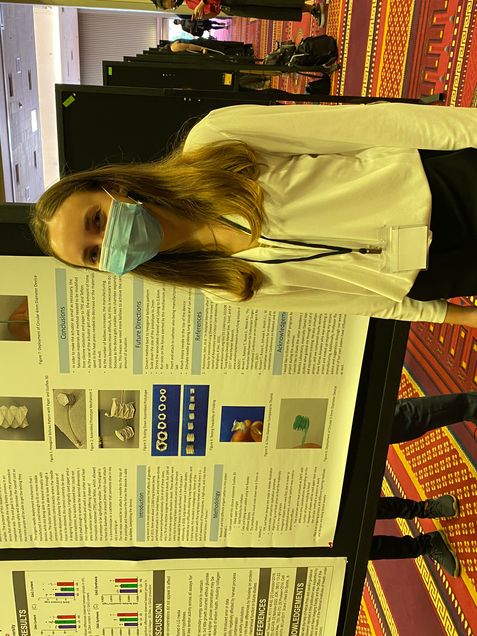Soft Robotics, 4D Printing: Undergrad Luce Scholars Present Research
Three ENG winners of the 2021 Clare Boothe Luce Scholar Award presented their research during the 24th Annual Undergraduate Research Symposium in the George Sherman Union Metcalf Ballroom.
The symposium was sponsored by Boston University’s Undergraduate Research Opportunities Program (UROP). More than 275 BU undergrads earned UROP funding and faculty mentoring to complete research projects over the summer. Out of that number, just six were selected for the Luce award. Three of them are ENG students, all in mechanical engineering.
“It’s a great honor for the students, and it also allows our funding to go further,” says Melissa Johnson, UROP assistant director.
Clare Boothe Luce was a playwright, journalist, congresswoman and ambassador. She established her namesake award to encourage women to enter the science, engineering, and mathematics fields. Luce awardees tend to be students who have demonstrated a dedication to research, says Johnson. The potential societal impact of the students’ proposals is also considered.

Sophie Caplan (’23) worked with Assistant Professor William Boley (ME, MSE) to develop a slicer that improves the print path in the 4D printing process, a newer form of additive manufacturing in which custom inks cause the printed object to shape-shift over time in response to programmed stimuli. Caplan and Boley’s slicer system makes it less tedious to design and program such objects.
“I am so honored to be named a Clare Boothe Luce Scholar,” says Caplan. “It was encouraging to be recognized in a space that I am so new in, and this award allowed me to feel confident in my abilities and my place in research.” Inspired by the experience, Caplan says she is continuing to work in the same line of research this fall.

Kiran Gomatham (’23) worked in the Morphable Biorobotics Lab under Assistant Professor Tomasso Ranzani (ME, MSE, BME). She helped design and optimize the manufacturing process of a major component of a soft robotic arm for minimally invasive heart surgery. The arm improves upon those currently in use by adding three degrees of freedom of movement as well as vertical expansion and contraction, for better maneuverability.
“This hands-on mechanical engineering experience is irreplaceable and has even enabled me to be a second author of a soon-to-be published IEEE paper,” says Gomatam, who remains engaged in the project. “I am eager to see what we will accomplish in the near future!”
Taylor Janke (’22) worked on another soft robotic device with medical applications. Under the guidance of Assistant Professor Sheila Russo (ME, MSE), Janke used a laser cutter and heat press to manufacture an expandable needle deployment mechanism aimed at a safer, simpler, and cheaper lung biopsy process. Next, she is working on testing and refining the device.
“The Clare Boothe Luce award was such an honor to receive,” says Janke. “It validated that my research project was a worthy and impactful one. As a result, I have continued to work on my device, and I am very excited to keep making improvements.”
